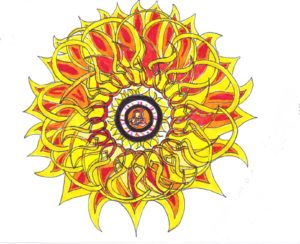I am learning more lately about Buddhist teachings. One that has stuck with me is about the five hindrances. As I understand it, the Buddha discovered, over a long period of time studying what was happening in his own mind, that we all have five main “traps” we can fall into even when we are just sitting and doing nothing!

“Success isn’t a result of spontaneous combustion. you must set yourself on fire.” -Arnold Glasow
“Fire is never a gentle master.” -Old English Proverb
The first is anger. My depiction of this trap is like being completely on fire. When we are consumed by the fire of anger, we do not see anything else around us. We are living completely from that place of anger and it doesn’t feel good! But, as soon as we realize that we are in that trap of anger, we have a little space between ourselves and the fire. We may still feel the heat, but we will also be able to see what lies beyond. Having awareness can change our experience tremendously.
None of us can help but feel anger arise in us at times. Some of us may have the experience of feeling anger constantly. Others of us have ways to hide anger-from other people and also from ourselves. It is a powerful emotion and one that our society or other people have lots of reactions to. Depending on what your childhood upbringing was, you might have an easier or harder time expressing yourself in anger.
Anger and all emotions are healthy and adaptive traits that we need in order to survive. However, when we don’t have perspective or awareness, emotions like anger can take over and drive our decisions. We may not like the results of these emotion-driven decisions. Part of our work in therapy can be to figure out ways to recognize your emotions, express them in ways that help rather than hurt you and the people around you, and give you a better chance of getting the outcome you really want in the long run.
The objective of therapy, meditation, or any other resource is not to get rid of our emotions (anger included). We are human, our emotions are tied to us wherever we go. They often help us take action and are to thank for getting us on top of the food chain. They are a great source of power for us and they are a gift.
Fortunately, we humans have many gifts. Along with anger and other emotions, we also have the gift of reasoning and being able to think ahead. For many of us, we need practice and help learning skills to get all our gifts working together and get out of habits that don’t serve us well.
Dialectical Behavior Therapy has many great resources for helping in this area from mindfulness and distress tolerance to emotion regulation and opposite action. These skills are simple but they are not easy to do. Practice is the key!